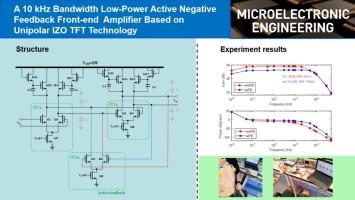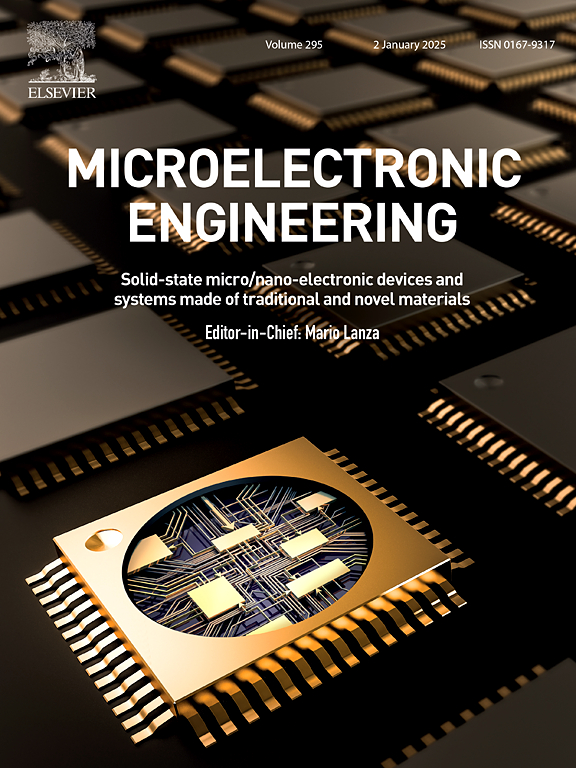A 10 kHz bandwidth low-power active negative feedback front-end amplifier based on unipolar IZO TFT technology
IF 3.1
4区 工程技术
Q2 ENGINEERING, ELECTRICAL & ELECTRONIC
引用次数: 0
Abstract
In this paper, we present a wide-bandwidth low-power front-end amplifier based on thin-film transistors (TFTs). The amplifier with the active negative feedback structure in the form of the common source is proposed, which achieves wide bandwidth under the condition of low power consumption. In addition, the capacitor bootstrap load structure is used in the core operational transconductance amplifier (OTA) circuit, which improves the loop gain. The proposed amplifier adopts the 10 μm channel length unipolar n-type indium‑zinc-oxide (IZO) TFT technology, with an area of 2 mm2. The test results show a gain of 36.3 dB, a bandwidth of 10 kHz, and a power consumption of 0.04 mW at a supply voltage of 10 V. The proposed amplifier is advanced in bandwidth, power, and area, has successfully obtained and amplified real-time electrocardiogram (ECG) and electromyography (EMG) signals, and also has excellent noise efficiency factor (NEF) and power efficiency factor (PEF). Therefore, the design has potential in the field of flexible bioelectrical signal detection and other wearable electronic devices in the future.

基于单极 IZO TFT 技术的 10 kHz 带宽低功耗有源负反馈前端放大器
本文提出了一种基于薄膜晶体管(TFT)的宽带低功耗前端放大器。该放大器采用共源形式的有源负反馈结构,在低功耗条件下实现了宽带宽。此外,在核心运算跨导放大器(OTA)电路中采用了电容自举负载结构,从而提高了环路增益。所提出的放大器采用 10 μm 沟道长度的单极 n 型氧化铟锌(IZO)TFT 技术,面积为 2 mm2。测试结果表明,在 10 V 电源电压下,放大器的增益为 36.3 dB,带宽为 10 kHz,功耗为 0.04 mW。所提出的放大器在带宽、功耗和面积方面都很先进,成功地获取并放大了实时心电图(ECG)和肌电图(EMG)信号,还具有出色的噪声效率因子(NEF)和功率效率因子(PEF)。因此,该设计在未来的柔性生物电信号检测和其他可穿戴电子设备领域具有潜力。
本文章由计算机程序翻译,如有差异,请以英文原文为准。
求助全文
约1分钟内获得全文
求助全文
来源期刊

Microelectronic Engineering
工程技术-工程:电子与电气
CiteScore
5.30
自引率
4.30%
发文量
131
审稿时长
29 days
期刊介绍:
Microelectronic Engineering is the premier nanoprocessing, and nanotechnology journal focusing on fabrication of electronic, photonic, bioelectronic, electromechanic and fluidic devices and systems, and their applications in the broad areas of electronics, photonics, energy, life sciences, and environment. It covers also the expanding interdisciplinary field of "more than Moore" and "beyond Moore" integrated nanoelectronics / photonics and micro-/nano-/bio-systems. Through its unique mixture of peer-reviewed articles, reviews, accelerated publications, short and Technical notes, and the latest research news on key developments, Microelectronic Engineering provides comprehensive coverage of this exciting, interdisciplinary and dynamic new field for researchers in academia and professionals in industry.
 求助内容:
求助内容: 应助结果提醒方式:
应助结果提醒方式:


